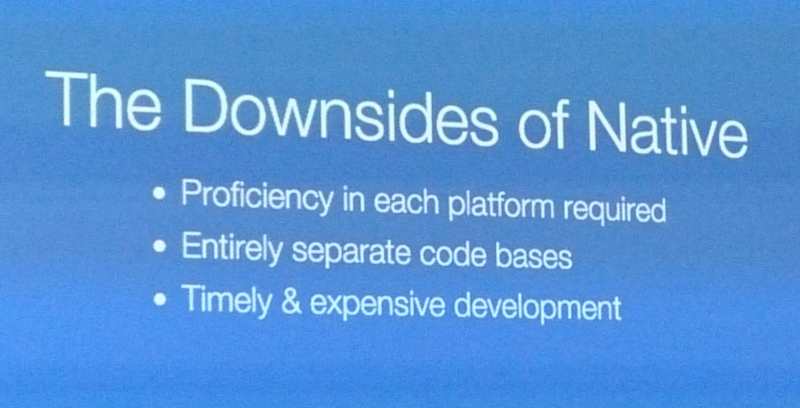December saw the topic of Ionic come to the London JavaScript Community meetup. It was a chance to expose the magic of Ionic to some already enthusiastic JS developers, some of whom may not have already looked at the mobile ecosystem, and some of whom perhaps had already been using other technologies to build mobile applications.

Meetup organiser Luca had bought in Sani Yusuf to present. Sani co-runs the Ionic UK meetup group so he was a wise choice indeed. The meetup itself was well over-subscribed on the site and it looked like the Skills Matter venue would be packed, sadly there seemed to be a lot of no-shows and I counted around 60 attendees in the end; not a poor showing, but down on what was expected.
I was joined at the meetup by one of the developers from Ceterna, one of our integration partners who build mobile Salesforce applications using MobileCaddy, and who more often than not choose Ionic as their framework of choice.
Ionic – Sani Yusuf
Starting from scratch Sani talked through the state of Mobile application development pre-Ionic; he mentioned the need to have multiple skill-sets to cover the different device OSs (IOS, Android, Windows, etc) and how this added cost and complexity to any project and organisation wanting to have apps that covered more than one target.

The needs to have two teams of devs, one objective C and one Java based, each with their own code bases… you can quickly see how having to do this can cause all sorts of an issues. This is amplified of course for any organisation (or individual) that doesn’t have the luxury of a big budget.
Native, is there an alternative – Sani Yusuf, 2015
Sani explained that with all this in mind Ionic entered the scene, answering the question “is there an alternative” with a resounding “yes”. Ionic is a JavaScript SDK that uses the Angular framework and the powers of Apache Cordova to enable developers with traditional (???) web development skills to code and build hybrid mobile apps capable of running on IOS, Android and Windows mobile devices.
The best tools are the ones that meet the developer’s needs, not ones that make them learn new stuff – Sani Yusuf, 2015
Ionic’s adoption has been truly amazing;
- In the top 50 “most starred” github repos – currently 21,000
- 1 million plus apps have been initially created using it.
- v1.2.0 was released last week.
We were then given a tour around the Ionic SDK and some of it’s key features. To be honest Sani didn’t need to say anything as I’m already a big fan. It was clear though from the questions and reactions from others in the audience that they were really excited by the platform continuity and the UI elements that you get for free with Ionic. Other tools that seemed to get a good raise was the ionic serve –lab command and the Ionic Lab. The aforementioned command allows you to see what the app will look like on the different OS types, and the Ionic Lab is a GUI tool that makes project creation and management easier for those who don’t like the command line.
To be brutally honest I think that perhaps Sani went into too much depth with each feature – he covered nav, tabs, side menu, slide affect, platform continuity, collection-repeat, and many more – and his talk heavily over-ran.
We were also given a brief look into what the future holds for Ionic and how the adoption of Angular v2 and Ionic v2 will bring even more goodness to the world of mobile application development. There’s a whole wealth of improvements in both camps, and Ionic’s v2 docs are a useful place to start if you want to find out more.
Sani’s slides are available here.
Wrap up
I think Sani did a good job of covering a topic as vast as Ionic, despite my feelings that the talk was probably too long.
The venue was cool, I’d been there previously for the Chrome Dev Summit and was aware that it’s a great setup for these sorts of things.
I was obviously saddened to hear that there wasn’t any pizza or (free) beer as I’d skipped lunch in preparation… but the biggest downside to the meetup was the lack of an “after chat” and the opportunity to share ideas and experiences with the other attendees. Hopefully the next meetup will have these re-instated (please).
I’m sure, and hopeful, that Ionic will continue to gain momentum and popularity and know from experience with the apps we’ve built with MobileCaddy that the enterprise mobile space is going to love it too.